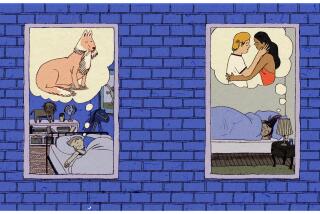Is dreaming a form of survival?
- Share via
No one really knows what dreams are for. But evolutionary psychologists theorize that humans started dreaming to promote survival by “rehearsing” adaptive responses to challenges.
“In prehistory it was, ‘How do I get away from saber-toothed tigers?’” says Sandy Ginsberg, an Encino psychotherapist who leads a weekly dream group and says she’s had, and heard, her own share of recession dreams of late. “We’re still dreaming about how to survive.”
About two-thirds of people surveyed say they’ve solved a practical problem in dreams, adds Deirdre Barrett, a clinical psychologist who teaches at Harvard Medical School — perhaps because “out of the box” solutions, shown visually, can eclipse the closed circles in which our logical minds travel.
Among such people are some eminent scientists who have credited breakthroughs to the options they saw in dreams.
In 1920, Otto Loewi, who later won a Nobel Prize, dreamed about a frog experiment that would later prove nerve impulses are transmitted chemically rather than electronically, the commonly held belief at the time.
And in 1864, the chemist Friedrich Kekule discovered the structure of the benzene molecule — a paradigm-shattering closed ring — after he dreamed of tumbling atoms formed into a coiled snake biting its tail. His insight paved the way for modern organic chemistry.
— Marilyn Elias






